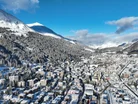Behind Siemens' Eco-Friendly Tech at WEF's 2025 Davos Summit

Global technology powerhouse Siemens has introduced its cutting-edge blue GIS medium-voltage system in Davos, Switzerland, marking a significant step forward in the field of sustainable power solutions.
Davos, the host town the World Economic Forum's (WEF) annual summit, is the chosen site for this initiative.
The upcoming summit begins on 20 January, 2025.This system, commissioned by Elektrizitätswerk Davos AG (EWD), replaces outdated switchgear that relied on sulphur hexafluoride (SF6) with Siemens' environmentally friendly Clean Air insulating gas.
This sets a new benchmark for green energy infrastructure.
Clean Air is a Siemens innovation aimed at reducing carbon emissions in energy distribution.
"The climate-neutral insulation medium used, which is comprised exclusively of natural components from ambient air, is a game changer, removing the need for fluorinated gases," says Jon Turner, Head of Siemens Distribution Systems Businesses for the UK and Ireland.
A climate-conscious solution for Davos
The innovative system has been installed at the Dorf substation and is pivotal for Davos, Europe's highest city, situated 1,560 metres above sea level.
Davos, known for its stunning alpine landscapes and as the venue for the WEF summit, experiences a significant increase in population from about 12,000 residents to over 40,000 during its peak seasons.
In 2023, the town recorded more than 1.3 million overnight guests, emphasising its substantial and diverse energy needs.
EWD's move to adopt Siemens' blue GIS technology echoes its commitment to sustainable energy solutions.
Andy Kollegger, CEO of EWD, understands the need for this transition.
“SF6 was never ideal for the environment," he explains.
"There was no doubt in our minds: If there is an alternative on the market that has the same functionality but without this disadvantage, we will switch to it.”
Innovating for Reliability and Sustainability
Part of Siemens' blue GIS portfolio, the 8DAB 24 switchgear system establishes a precedent in environmentally conscious power technology.
Unlike SF6, a powerful greenhouse gas, the Clean Air insulation medium consists of natural air components, ensuring it is safe, non-flammable and stable across various temperatures.
This innovation reflects Siemens' readiness to meet and surpass the European Union’s stringent regulations aimed at reducing SF6 use.
“If we want to achieve our net zero targets, we need to make power grids future-ready with innovative, eco-friendly technology,” says Matthias Rebellius, CEO of Siemens Smart Infrastructure.
“I am pleased that our long-standing customer EWD is using our pioneering switchgear technology that paves the way for climate-neutral and smart power distribution in Davos.”
Bridging the digital and physical worlds
The switchgear incorporates smart sensors and interfaces connected to Siemens' Electrification X platform, part of the company's Xcelerator Internet of Things suite.
This digital ecosystem facilitates real-time monitoring, boosts energy efficiency and handles operational challenges encountered by both public and private grid operators.
Meeting high expectations in a unique setting
Davos’ reliance on renewable energy sources and its extensive energy infrastructure — which includes three substations, 168 transformer stations and more than 450 kilometres of power lines — necessitates robust and dependable systems.
The blue GIS technology ensures minimal environmental impact while robustly supporting the town's vital infrastructure, encompassing homes, businesses and global event venues like the WEF summit.
EWD's dedication to sustainability extends beyond power distribution; the utility also provides renewable heat and hydropower to its clients and has been integral to Davos' energy resilience for more than 130 years.
Andy reiterates the importance of their environmental commitment in his decision to adopt this innovative technology.
“There was no doubt in our minds,” he asserts, referring again to the switch to a greener alternative.
The implementation of Siemens' blue GIS system in Davos symbolises a broader move towards more sustainable energy systems that prioritise long-term ecological integrity without sacrificing performance or reliability.
As Matthias succinctly puts it: “It is essential to invest in the continued expansion of power grids.”
Explore the latest edition of Energy Digital Magazine and be part of the conversation at our global conference series, Sustainability LIVE.
Discover all our upcoming events and secure your tickets today.
Energy Digital is a BizClik brand



